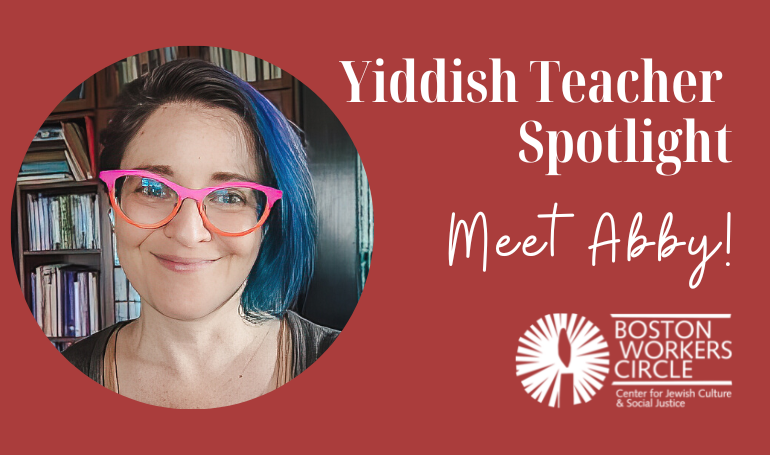
Yiddish Teacher Spotlight: Meet Abby!
Welcome to our new series: Yiddish Teacher Spotlight! Throughout the year, we’ll interview as many of our Yiddish teachers as we can so the whole community can get to know them a little better.
BWC: Can you tell us a little bit about why Yiddish is important in your life and why you like to teach Yiddish?
Abby: Yiddish is important to me because it’s my ancestral heritage language. Knowing and speaking Yiddish have helped me feel a connection to my family and my Jewish heritage.
BWC: What is your background in Yiddish? Are you a native speaker or did you come to it later?
Abby: I started studying Yiddish as an undergraduate studying Linguistics at the University of Texas in Austin. I was an intern at the National Yiddish Book Center that summer, and the following year I was a student at the YIVO summer Yiddish intensive program. I attended the Yiddish Vokh for 12 years in a row, and that’s where I really started to feel like a fluent Yiddish speaker, and where I got to meet and connect with other Yiddishists and started to consider myself a member of a community of Yiddish speakers.
BWC: What do you like most about teaching Yiddish and why?
Abby: I love teaching Yiddish for so many reasons! It’s really gratifying to see my former students go on to achieve great things in Yiddish. I love getting to know the students – we get a fascinating and brilliant set of students who sign up for our classes. It turns out, the kind of person who chooses to take a Yiddish language class is usually highly-educated, loves to learn, and is a collector of obscure facts about history, Judaism, and linguistics. And it’s wonderful to give back and help grow this community of Yiddish speakers which has been so important to me.
BWC: If you’ve taught both in person and on Zoom, can you talk a little bit about what’s different in those two settings? Do you have a preference for one or the other?
Abby: I used to teach in person, and for the past three years, I’ve been teaching on zoom, and I hope to continue with the zoom classes for as long as they continue to be popular! When we were in person, I spent a lot of time photocopying handouts each week before class, so that everyone would have something to follow along with in class. I assigned written homework, and I would hand-grade the written homework with a red pen and pass it back to students, and that was a way to give one-on-one feedback and corrections. We also used to sing Yiddish songs together every week when we were in person.
Now that we’re on zoom, I no longer give written homework (I haven’t figured out a way to grade it and give it back to students, and I don’t think anyone misses it). I no longer carry physical books into the Worker’s Circle building to photocopy handouts before class, and instead, I find a digital copy of whatever text we are looking at, and share my screen in class so that students can follow along. Since we moved classes to Zoom, we have switched to using verterbukh.org and englishyiddishdictionary.com instead of physical dictionaries, and that’s been a huge win, because it’s so much faster and easier to look things up and we don’t get stuck on vocabulary any more. One thing I haven’t figured out how to do, that I miss, is the way I used to teach the students a new song each week and we would sing it together. I haven’t figured out how to teach Yiddish songs on zoom in a way that doesn’t feel awkward.
BWC: Can you share a Yiddish word or phrase with us that you’re particularly fond of or think it would be great if everyone knew?
Abby: A recent favorite word is דיך לעפֿל (dikh lefl / sciatic nerve) which we learned recently when my Intermediate Yiddish class was reading Genesis in Yehoyash’s Tanakh. Every week, we get to another outrageously-memorable story.
Jacob is traveling in the desert with his four wives and 11 children, but is for some reason alone in his tent. He is come upon in the night by a mysterious stranger, and they naked-wrestle each other until dawn. When he sees that he will not be defeated, the stranger reaches out and touches Jacob’s dikh-lefl (literally, “thigh-spoon”, “hip crease”) and wrenches it. As the sun starts to come up, the stranger says, “the sun is coming up, I’ve got to go”. Jacob says “I won’t let you go until you give me your blessing”. The stranger asks “what is your name?” and he answers: “Jacob”. The stranger gazes into Jacob’s eyes and says, “Shhh. I’m gonna call you Yisroel. That’s your name now. Because you’ve wrestled with god and with man and have emerged victorious”. Jacob asks the stranger, “What is your name?” and the stranger answers, “Why would you ask me that?” and then abruptly departs. They never see each other again.
Therefore, to this day, the children of Israel do not eat the tendon that is attached to the dikh lefl, because of how he touched the lefl of Jacob’s dikh, the tendon.
To my students, the whole story sounded like a recount of a hot Grindr date. We laughed and laughed about the stranger touching Jacob’s dikh-lefl and about how it seems like a clandestine story of forbidden gay love. But it’s also a parable about the Jewish intellectual relationship with God, and an explanation about why kosher meat is so expensive (because they don’t eat the entire back half of the cow, just in case the tendon of the dikh-lefl might not have been properly excised.) And I don’t think any of us will ever forget how to say “sciatic nerve” in Yiddish.
BWC: Can you share a link to a favorite Yiddish song or performance our readers might enjoy? Let us know what you love so much about it!
Abby:I love this video of Adrienne Cooper singing Ver Vet Blaybn by Avrom Sutszkever. I love it because once the song gets stuck in your head, which it will, then it won’t be long until you have the poem memorized, and what is more satisfying than that?
Have you registered for Yiddish classes this semester yet?
If you enjoyed this Yiddish teacher spotlight, head on over to our Yiddish Classes page to check out the classes Abby and others are teaching this semester! There are just a couple of spots left in these classes, which start meeting the week of February 13th.
